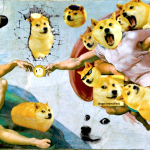Seven Gen Z and cusp-Millennials working in philosophy give their perspective on internet and TikTok-viral aesthetics. Continue reading

March 7, 2024
by Aesthetics for Birds
2 Comments


March 7, 2024
by Aesthetics for Birds
2 Comments
Seven Gen Z and cusp-Millennials working in philosophy give their perspective on internet and TikTok-viral aesthetics. Continue reading

December 30, 2023
by Aesthetics for Birds
0 comments
From the 1990s silver screen to the depths of the internet, here are our staff picks of 2023. Continue reading

October 22, 2021
by utahphilosoraptor
3 Comments
If Chappelle’s art dines on controversy, cancellation serves it dessert. Continue reading

April 14, 2021
by Aesthetics for Birds
17 Comments
Digital blackface is actively skewing our perception of what blackness contains, and thus what possibilities are open to all of us. Continue reading

March 31, 2021
by Aesthetics for Birds
0 comments
To understand how ‘Caliphate’ and ‘Reply All’ have gone wrong, we need to understand how the conventions and function of podcasting have created distinctive forms of media. Continue reading

December 2, 2020
by utahphilosoraptor
0 comments
Think of the monolith as a monument, an artwork addressed to a group. When it was revealed to the world, we determined its meaning. Continue reading

September 9, 2020
by Matt Strohl
0 comments
What follows is a co-authored post by Brandon Polite and Matthew Strohl. It is the first piece in a two-part series. See part two here. The ascendancy of the internet has generated a wide range of difficult new questions for philosophers of aesthetics. Our concern in this piece is the way the internet has reshaped aesthetic discourse and has made aesthetic disagreement far more immediate and pervasive. Social media allows users to broadcast their evaluations of artworks to hundreds or thousands of followers any time of day and, as a result, has ushered in the Golden Age of Everyone Having an Opinion. We are specifically concerned with the general tendency of the internet to promote hostility in aesthetic discourse. Rampant hostility has emerged in a wide variety of contexts, ranging from large-scale fan movements to remake a poorly received season of a widely loved television series or a controversial entry … Continue reading

September 3, 2020
by Anthony C.
1 Comment
Aesthetic styles associated with particular subcultural communities aren’t new. So what’s so significant about internet aesthetics like “dark academia”? Continue reading

May 21, 2020
by Alex King
2 Comments
Now that increasing numbers of people are stuck at home and sheltering in place, I figured I’d do a little series. Every weekday for the duration of this intense period, I’ll post a short definition of some term in/related to aesthetics and philosophy of art. Let’s see how this goes! See them all here. Terms of Art #39: meme & memetics
July 20, 2017
by Aesthetics for Birds
0 comments
Google Translate’s Emergent Poetry Some of you will be familiar with computer poetry, poetic compositions generated by computers using algorithms. Some of you may even be familiar with computer prose, as the book The Policeman’s Beard is Half Constructed (text here). There are lots of things to say about this. Who’s the author? Is it really poetry? And what does it say if computer poetry passes the Turing test? Last week, I stumbled upon something new in this neighborhood, care of Google Translate. You might think this would be generated by inputting something funny (but promising if you think about it) like assembly instructions or political speeches–or even something translated into a different language, then translated back. Instead, this Google Translate poetry takes as input a single, repeated Japanese hiragana character. As you can see above, the returns are surreal and delightful. (For all of these, I’ve used ‘ke’, け.) See here and here for … Continue reading